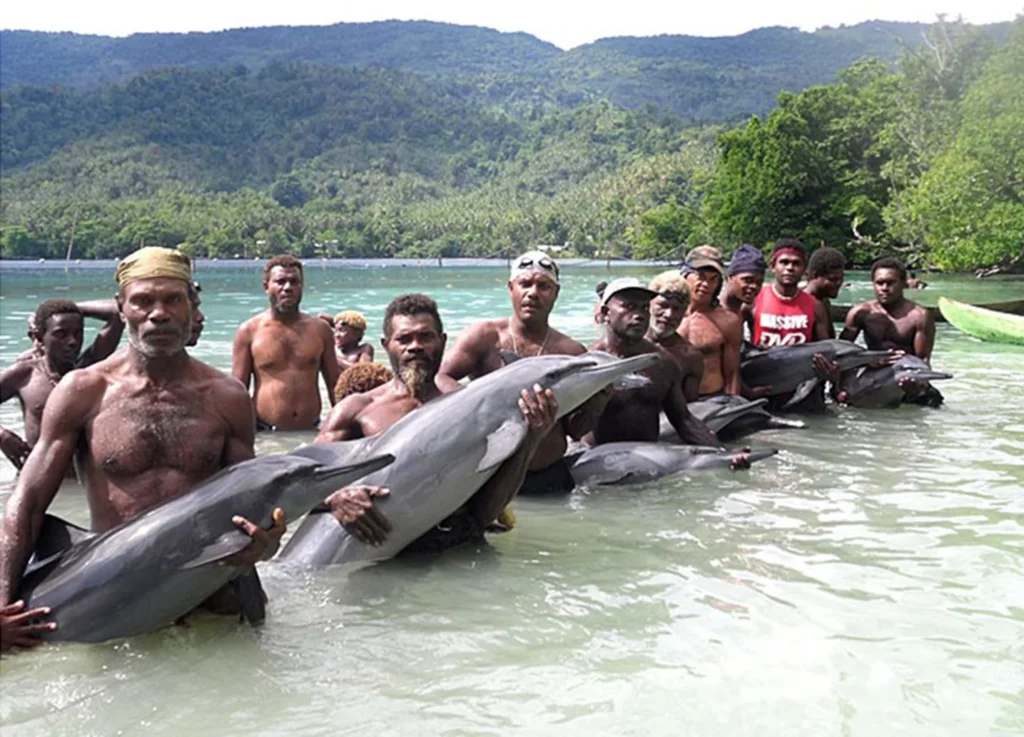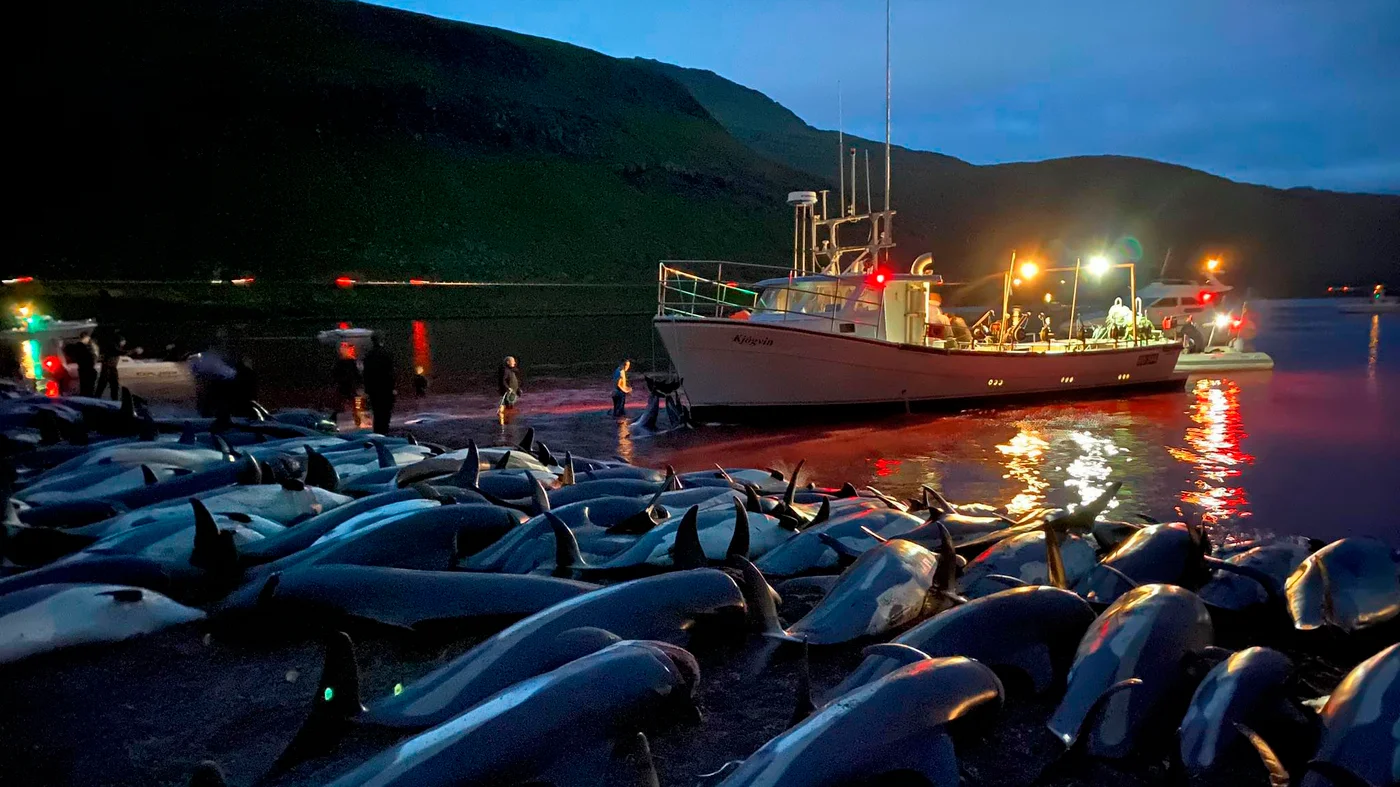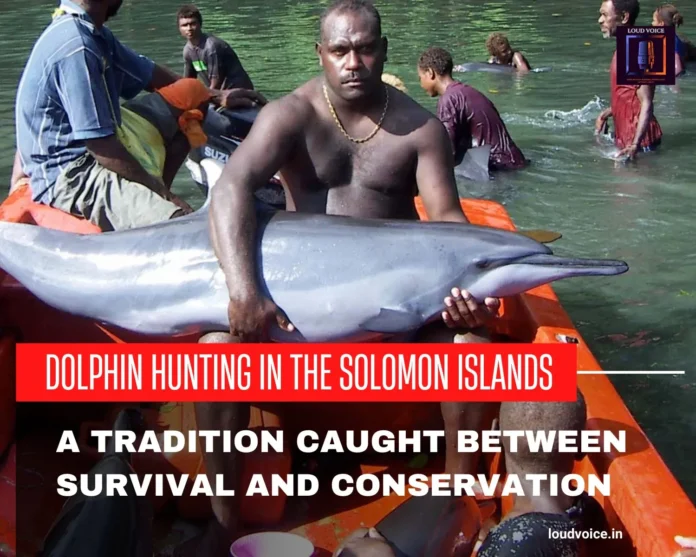Dolphin hunting in the Solomon Islands: Introduction
Dolphin hunting in the Solomon Islands has long been a cultural tradition, but today, it carries heavier stakes. As rising sea levels threaten their homes, the islanders of Fanalei rely on dolphin teeth—used as currency—to secure land for relocation. While conservationists argue against the hunt, islanders insist it is their only means of survival. The debate surrounding this practice raises critical questions about cultural preservation, economic necessity, and environmental ethics.
A Call to Hunt: The Ritual Begins
Under the glow of the moon, Fanalei hunters answer the call of the conch shell, signaling the beginning of a traditional dolphin hunt. Before setting out, they gather in the village church for a whispered prayer, acknowledging the significance of the hunt in their culture. Paddling miles into the open ocean, they search for pods, using bamboo poles and coordinated signals to alert fellow hunters.
Once a pod is spotted, the hunters engage in a carefully orchestrated effort to corral the dolphins toward the shore. The sound of beating rocks beneath the water serves as a driving force, forcing the dolphins into shallower waters. The entire village is engaged in the hunt, with children climbing trees to catch glimpses of the chase and families gathering on the shore to await the results.
Why the Islanders Hunt Dolphins
For the 130 residents of Fanalei, dolphin hunting is not merely a tradition—it is an economic necessity. The teeth of dolphins, valued at 3 Solomon Islands dollars per piece, serve as a local currency. A single hunt, yielding around 200 dolphins, can generate tens of thousands of dollars, exceeding any other economic activity on the island. This income helps families afford necessities such as food, education, and medical care.
The motivation behind the hunt is clear: climate change. The island, no larger than a fraction of New York’s Central Park, is disappearing beneath rising tides. With crops failing due to saltwater intrusion, villagers see dolphin teeth as the only viable resource to purchase land on higher ground. Some families have already relocated, using earnings from previous hunts to purchase parcels of land on South Malaita Island, where they hope to rebuild their community.

The Role of Dolphin Teeth in Fanalei Society
Dolphin teeth are deeply embedded in local culture and economy:
- Used as currency to buy goods and land
- Essential in traditional bride price ceremonies, where a groom’s family presents hundreds of teeth to the bride’s family
- Contributed to community projects, such as building a church, a seawall, and a school extension
Beyond economic value, the hunts foster a strong sense of community, reinforcing social bonds and shared responsibilities. The strict distribution system ensures that every family, including widows and orphans, receives a share of the hunt’s proceeds. Chiefs oversee the allocation, ensuring fairness and long-term stability.
The Uncertainty of the Hunt
The dolphin hunting season runs from January to April, with some years yielding over 1,000 dolphins. However, changing weather patterns have disrupted the hunt, making it harder to locate and capture pods. In 2025, halfway through the season, only one successful hunt had been recorded.
The process involves herding dolphins toward shore by creating an underwater cacophony using fist-sized rocks. Yet, modern obstacles, such as passing trawlers, can disrupt the hunt, scattering the pod before capture. With fewer dolphins being caught, some villagers worry that their economic future is in jeopardy.
While the meat is consumed or bartered with neighboring islands, it is the teeth that hold the true economic and cultural value. As hunting conditions grow more unpredictable, some islanders have begun exploring alternative sources of income. However, government initiatives—such as promoting seaweed farming—have not yet provided sufficient financial stability.
Conservation vs. Survival: A Complex Debate
Critics argue that dolphin hunting is unsustainable. Marine biologists, including Rochelle Constantine and Kabini Afia, suggest that while some species maintain healthy populations, the long-term effects remain unclear. Conservation organizations advocate for an end to the practice, pointing to ethical concerns and declining dolphin populations in some areas.
Despite external efforts to end the hunts—such as cash incentives from conservation groups and government-backed seaweed farming initiatives—villagers find these alternatives insufficient. The ocean remains their most profitable resource.
However, some islanders acknowledge that hunting cannot continue indefinitely. Younger generations, exposed to global conservation movements, are questioning the sustainability of the practice. Discussions about alternative economic strategies, including potential eco-tourism ventures, have begun circulating within the community.

The Future of Fanalei: An Uncertain Horizon
For Fanalei’s residents, the real question is not whether dolphin hunting is sustainable but whether their island will survive. With government research predicting that Fanalei may be underwater by the end of the century, many islanders are determined to use the hunt to secure a future elsewhere.
Some families have started relocating to neighboring islands, using the income from dolphin teeth to purchase land and rebuild their homes. Yet, the uncertainty of relocation poses new challenges, as available land is limited and integration into new communities can be difficult. Islanders fear losing not only their homes but also their cultural identity.
As hunter Lesley Fugui puts it, “Dolphin hunting may be our identity, but our lives and the lives of our children—that’s what’s important.”
Exploring Alternatives: A Path Forward?
While dolphin hunting remains a critical economic activity, some villagers and international organizations are working toward sustainable alternatives. Potential solutions include:
- Eco-tourism: Leveraging the region’s rich marine biodiversity to attract visitors interested in conservation and indigenous culture.
- Sustainable Fishing Practices: Shifting towards non-endangered fish species and government-supported fisheries.
- Handicrafts & Trade: Promoting locally made crafts and goods to generate alternative income.
These efforts are in early stages, but they provide hope that Fanalei’s people may eventually transition to more sustainable livelihoods without abandoning their heritage.
Final Thoughts
The dolphin hunt in Solomon Islands sits at a crossroads between tradition, necessity, and environmental ethics. While conservationists call for an end to the practice, the islanders of Fanalei see no alternative in their fight against an encroaching ocean. The challenge ahead is finding a sustainable balance—one that ensures both the survival of Fanalei’s people and the dolphins they rely upon.
As climate change continues to reshape traditional ways of life, the story of Fanalei serves as a poignant reminder of the complex relationship between cultural heritage, economic survival, and environmental responsibility. Whether through adaptation, migration, or innovation, the islanders must navigate an uncertain future—one in which the fate of both dolphins and people hangs in the balance.


